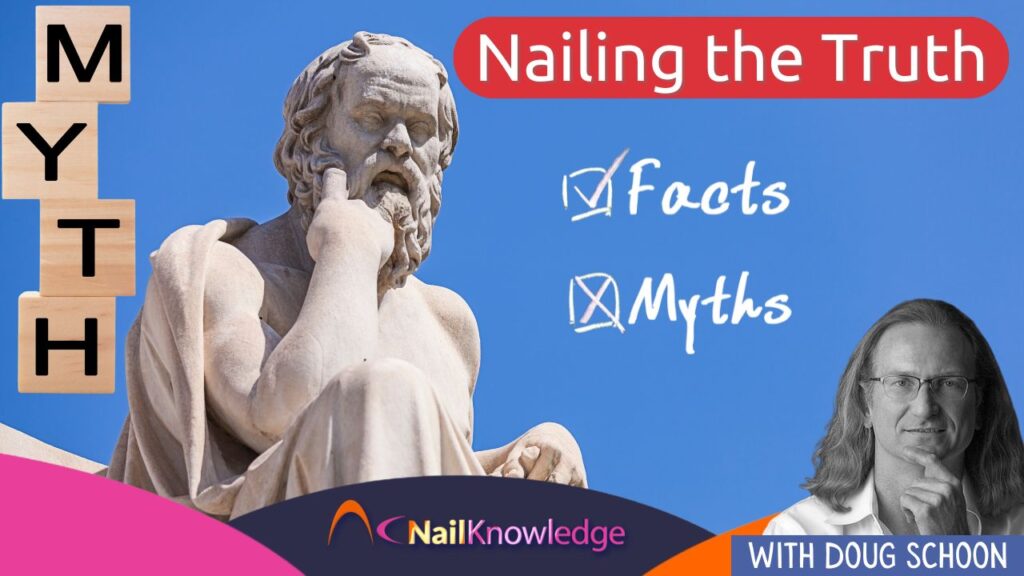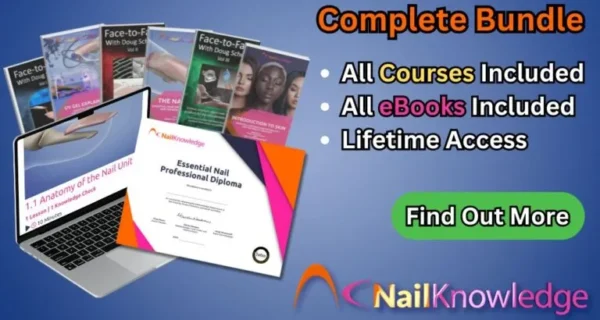In the ever-evolving world of nail care, the line between fact and fiction can often seem as fine as a freshly filed nail. One of the recurring challenges that both professionals and enthusiasts face is the abundance of misinformation swirling through the industry, from fellow nail technicians to the very manufacturers of our tools and products. A common concern, expressed poignantly by a reader, captures the essence of this struggle: ‘I do my research, but there is so much incorrect information coming from other nail technicians and even from manufacturers. How am I supposed to separate the facts from the myths?’
No NailKnowledge, abordamos continuamente os mitos e esclarecemos dúvidas por meio de uma infinidade de perguntas feitas por nossos leitores. Hoje, vamos nos aprofundar em alguns dos mitos mais arraigados para revelar as verdades escondidas sob o verniz brilhante da superfície.
Eliminando os mitos: O método socrático no cuidado com as unhas
Determining fact from fiction is an age-old problem that has existed since the beginning of civilization. In other words, misinformation has always been a problem. The best solution to this dilemma was discovered about 2500 years ago by a Greek philosopher named Socrates. Socrates and the people living in his time didn’t have to deal with the all the baloney circulated on the Internet or by the news media, but they sure did have their own fair share of myths and misinformation to deal with. So, Socrates developed a method to help him get the facts and he taught this method to his followers.
Seu método foi tão bem-sucedido que as pessoas o utilizam regularmente até hoje! Esse método é usado por juízes, advogados, repórteres, detetives e cientistas que procuram fatos e pistas sobre os fatos, mas qualquer pessoa pode usar esse método porque ele é muito simples, mas altamente eficaz.
Socrates’s method can be boiled down to just these two words, “Question Answers”. Yes, it is that simple, yet it is powerful! Don’t just accept what you are told. That is how nail technicians are often fooled. Instead, ask lots of questions, and keep asking until you are satisfied you fully understand. It’s all about the questions you ask. Here are some examples for you to try.
Polimento da verdade: o poder das perguntas abertas no cuidado com as unhas
The best way to get answers is to ask open ended questions. Start with the simplest question of all… Ask “Why”? Quando alguém lhe disser algo que você suspeita estar incorreto, faça a seguinte pergunta, “Why do you believe this is true?” E ouça atentamente a resposta para obter pistas sobre o que eles realmente estão dizendo.
Ou pergunte “How do you know this?” Outra pergunta interessante é, “Where does your information come from?” e “What does this mean?” Ou meu favorito, “Please help me understand why I should believe this?” Ou, “Why is this information important?” If you don’t understand their explanation say, “Explain that to me in a different way so that I can understand.” Ou “What does that mean?” Esses são apenas alguns exemplos do tipo de perguntas abertas que podem ajudá-lo a fazer uma pesquisa melhor e a obter um entendimento mais profundo sobre qualquer assunto.
Revelando camadas: O Poder Revelador das Perguntas Persistentes no Cuidado das Unhas
Those who don’t know what they are talking about will have a hard time answering such questions. Those who want to deceive you, will not like being questioned. In either case, if someone doesn’t know the facts, it will be obvious when these types of questions are asked. And those who don’t want you to know the facts, will become uncomfortable.
When people ask me questions like this, I love it! This provides an opportunity to explain in greater detail and lets me know the questioner is interested. It’s an opportunity to provide more detailed information, which I always appreciate. Don’t stop asking “why” and “how” until you get to the root of the issue and feel you understand the facts. You’ll learn that some don’t know why they believe, they just do and will have no clear answer to your questions.
Além da superfície: A importância do questionamento no cuidado com as unhas
Finally, don’t just accept what you hear or read and don’t just look at the headlines and expect you know the facts. Headlines are often intended to fool people, since those writing the headlines know most won’t take the time to read the article and won’t ask questions. Many are afraid to ask questions, but now you understand the tricks used by professionals who ask questions for a living.
With practice, you’ll find it’s easy. Take the time to Question Answers! And you’ll be the wiser for it. Like anything, it takes practice- so dig in and don’t give up until you get the answers to your questions.


